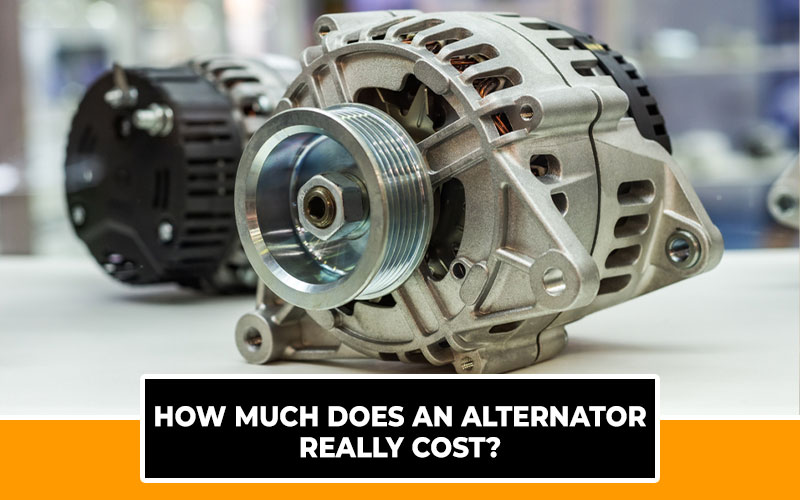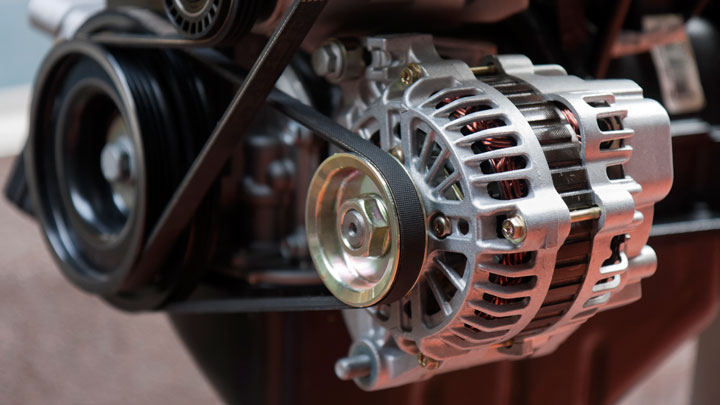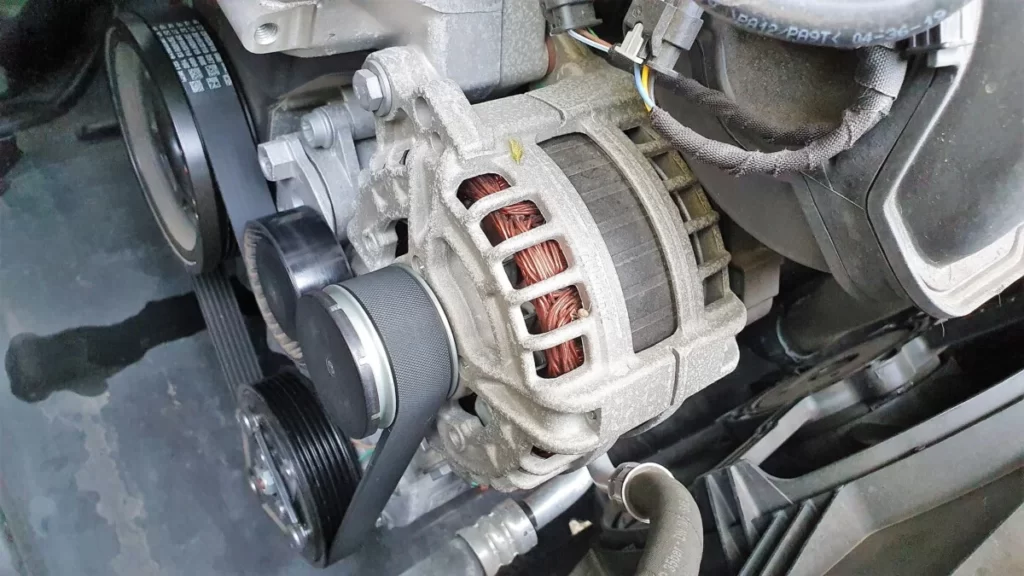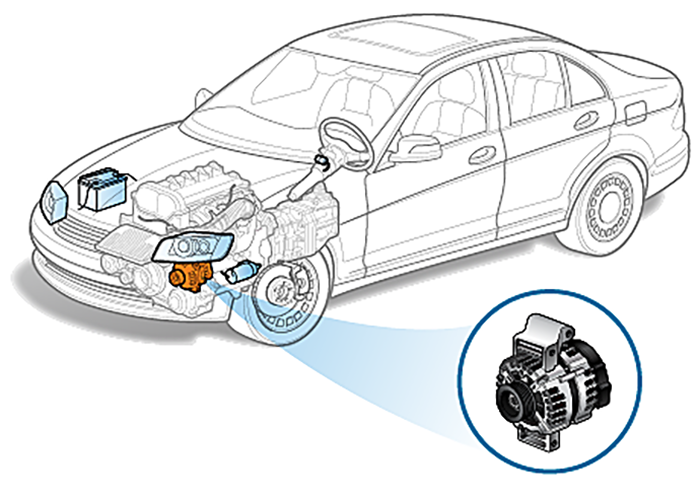
How Much Does It Cost to Replace An Alternator?
The alternator is one of the hardest parts to work on a vehicle. The alternator not only powers all the vehicle’s electrical components while the vehicle is running but also charges the vehicle battery. If you’re dealing with a faulty alternator, depending on your vehicle, it could cost $500 or more to replace it with brand new parts from the vehicle manufacturer. We’ve broken down what an alternator is, how to know if your alternator is broken, and how much it actually costs to replace it.
What Is An Alternator?

A car’s alternator generates most of the electricity in the car, powering everything from the radio to the taillights. Here’s how it works:
- Your vehicle’s engine turns a belt that connects to the alternator through a pulley system.
- This pulley spins the alternator’s rotor shaft and a set of magnets that surround the coils, producing an electrical current.
- Alternating current (AC) is directed to a rectifier, which converts it into the direct current needed to run the vehicle’s electrical system and charge the car’s battery.
Your car battery stores the excess power produced and stores it for use when power is needed when the engine is not running, such as when starting. An alternator is a fairly standard equipment in most cars, although some hybrid models don’t have one.
The Role Of The Alternator
Today’s cars require staggering amounts of power. Not only are there obvious systems that require power, such as the radio, power windows, door locks, sunroof, and heated seats, but there are also modules and sensors all around. For example, anti-lock brakes typically have a wheel speed sensor on each wheel, an anti-lock brake control module, an ABS pump, and other associated parts that require constant power.
The alternator takes power from the battery and amplifies it as an electromagnet to provide enough power to sustain all the power needs of the car while the engine is running. It can also generate enough power to send some back to the battery to replenish it. The alternator’s magnetic rotor and copper windings generate alternating current (AC), which is then converted to direct current (DC) by a set of diodes in the rectifier, the type of electricity required for the operation of automotive equipment. The voltage output is regulated to prevent damage from overcharging and underpowering.
If the alternator is not producing between 13.5 and 14.5 volts, making noise, or if the wrong type of current is passing through the alternator, the alternator is faulty and needs to be replaced.
How Long Do Alternators Last?
It is difficult to predict the life of an alternator because there are many factors that affect the life of an alternator. These factors include how the car is driven, the climate in which it is driven, and the electrical equipment that the car operates on a regular basis. You can replace your alternator if you plan to keep your car for more than a few years. The alternator usually lasts 40,000 to 100,000 miles.
Signs of a Bad Alternator

A damaged alternator (not to be confused with a faulty alternator belt (also known as a serpentine belt)) can be difficult to diagnose because many of the symptoms of a faulty belt are the same as those of a faulty battery, and both can be debilitating to the point of Diagnostic tests were not immediately available. In layman’s terms, it’s hard to know what’s wrong with your car’s electrical system when there’s no electricity.
Many of the symptoms of an alternator failure are often the same as the symptoms of a battery failure. “
Here are a few common symptoms of alternator failure:
The battery indicator on the dash: If your dash shows the word “charging” or the battery symbol after the battery is turned on, it means there is a problem with your charging system (not necessarily your actual battery).
Low battery: A faulty alternator cannot charge properly when the engine is running, so a low battery could be a sign of an alternator problem. The best way to tell if it’s your battery or the alternator is to install a new battery. If it died shortly after installation, your alternator is likely to be the culprit.
Difficulty starting: If your car is having trouble starting, it may be because of your alternator. If the alternator fails, your battery won’t have the necessary power to start your car.
Grinding or whistling: If you hear some unexpected noises like grinding or whistling, it may be due to debris inside the alternator. For example, if a bearing in an alternator begins to fail, the resulting noise is often difficult to ignore.
Weakening power: Because your electrical components are powered by an alternator, a weakening of power may be a sign of an alternator failure. Look for things like slow rolling windows, dim headlights, or slow windshield wipers.
Regardless of the reason, if something goes wrong with your vehicle, it’s important to schedule an inspection by a licensed mechanic. They can test different parts of the vehicle and use the OBD-II readings to pinpoint the problem. You may have to pay for these tests, but they should help you avoid paying for unnecessary repairs.
Can You Drive With An Alternator Problem
Most of the time, short-distance driving is fine when the alternator is undercharged. Backup power from a battery can replace electricity, for example, if you drive a few blocks to a repair shop. However, if your alternator is overcharged, it can damage computer modules, batteries, and other electronics or wiring, even during short driving periods.
When you detect an alternator failure, the most important thing is to get it fixed. If you’re not sure if it’s safe to drive, err on the side of caution and arrange for a tow truck to take it to your destination.
How Often Do Alternators Need To Be Replaced?
Unlike brake pads, tires, or even snake belts, it’s hard to gauge the life of an alternator. For some cars, it will last a lifetime, while for others they will need to be replaced multiple times during their course of action.
Generally speaking, the life of an alternator should be between 7 and 10 years. This could be anywhere from 100,000 to 150,000 miles. If you’re questioning whether your alternator is working properly, or you want to schedule a test for it, AutoZoner is a great resource to take advantage of our free alternator testing service. . If you’re looking to buy a warranty-backed replacement alternator or get a job advice, AutoZone can help, or if the job seems too big, check out our list of top stores in your area to help you get back on the road. Also, if at any point the job seems too big, check out our list of top stores in your area that can help you with the job.
How Much Should an Alternator Replacement Cost?
The average time to replace an alternator is 2 to 3 hours. This gives you about $120-200 in labor to start with. The rest of the cost will depend on the price of your alternator. Most alternators can be purchased from auto parts stores for much less than original equipment (OEM) replacements manufactured through a dealer, but buyers must be aware of this. Some discount auto parts stores have electrical parts of lower quality than original equipment on a new car. Buying an aftermarket alternator is not inadvisable and can save you a lot of money; however, make sure you are using quality parts. Buying a new alternator from the same company that made the original version (OEM) is a wiser buying decision. Depending on the make and model, the average price of an alternator is between $100 and $350. If no other parts need to be replaced, the total cost of an alternator replacement for most vehicles will be between $350-400. If the serpentine belt is included in the process, add an additional $20 to $50 to your bill. If you decide to use dealer parts and labor, expect the bill to climb above $500 in many cases. Since the total cost depends on the vehicle, expect to replace the alternator for between $350 and $900.
How Much Does It Cost To Fix An Alternator?
Repairing a car’s alternator is usually not a viable option compared to replacing the alternator. There are several reasons for this, but the main one is that repairing something is more labor-intensive than replacing it.
- Alternator repairs may require diagnosing, removing, and dismantling existing alternators, installing new components, testing, and reinstalling.
- Replacing an alternator is as simple as buying a new or rebuilt alternator, taking out the faulty unit, and putting in the new or rebuilt unit.
In theory, alternator repairs could be cheaper, especially for high-end cars, but it’s not that common. If you want to explore all your options, ask your mechanic for a detailed repair quote and compare it to the replacement cost. Itemized quotes will allow you to see exactly what you’re paying for, how much of it is labor-related, and how much is parts-related.
Factors Affecting the Price of an Alternator

The new alternators may look roughly the same, but the differences between them will affect their price. They include:
Year, make, model, and engine size. It’s only going to be an exact match for your car’s needs, so be sure to buy parts like an alternator with its specs in mind.
Current. Small alternators that don’t need to generate electricity for cars tend to have less content of high-value materials, such as copper used in windings. Therefore, the manufacturing cost is lower. However, this is not always the case.
Its installation style. Because the alternators need to be perfectly matched, you can’t choose a low-cost alternator for different cars. This doesn’t work.
Type of electrical connection. Older car alternators that are considered 1-wire alternators are generally less expensive, while 3-wire alternators tend to be more expensive.
Warranty on new parts. Opt for new parts with a 1-year warranty and expect to cost more initially than similar parts with a lifetime warranty.
Bottom Line
The alternator is a critical component of the vehicle and has many important functions. Knowing the warning signs of an alternator failure and how much you can pay for a new alternator can prepare you for the need to replace the alternator on your vehicle.
Read the following post about spare parts replacement if you are interested!
- How to Change Your Cabin Air Filter – Everything You Need to Know
- Water Pump Replacement Cost – Price Comparison 2022
- How Long Does it Take to Charge a Car Battery -What You Should Know?
- How To Remove Rain X Wiper Blades
- How to Prevent and Remove Rust on Your Car
- How to Remove a Stuck Door Hinge Pin?
- How To Check And Replace a Coolant Hose
- How Much Does a Fuel Injector Replacement Cost?
- How to Change an Audi Key Battery
- How to Replace An Engine Splash Shield


Average Rating